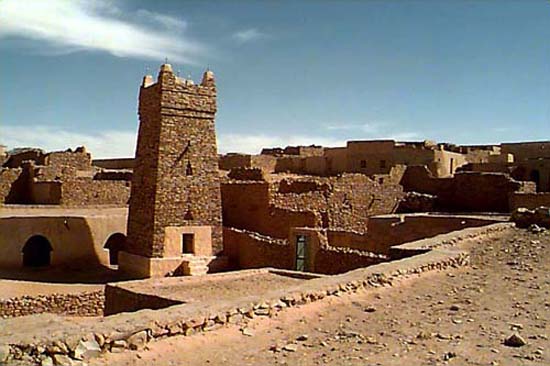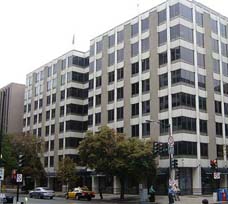
"Somberly, too, the lack of available technology also means the lack of an arena for practice. This self-taught semi-geek relied on years of experimentation with plentiful computers to be able to maintain a website and fix basic computer issues overseas. Here, 18-year-old girls have never used a mouse and find the concept of a double-click foreign and disturbing. Here, a middle-aged man wonders if to enter an online contest you have to somehow send the paper form through the computer. This, too, contributes to the short lifespan of technology: incompetency."
Peace Corps Volunteer Aaron D.D. writes: A Few Words About Mauritanians and Technology
And now… A Few Words About Mauritanians and Technology
Mauritania’s Three Horsemen - sand, sun, and heat - bleach and blast their way through any obstacle. Buildings, cars, clothes, anything normally deemed permanent and resolute takes an alarmingly short time to disintegrate. Everything once-new becomes a faded and jagged skeleton: alongside the frequent half-constructed houses are, like shadows, their half-demolished counterparts.
One would think those are the biggest threats to technology’s thriving here. Gadgets are, of course, very susceptible to these enemies. But Mauritanian fastidiousness goes a long way toward combatting against them. Before and after their use, they are stored indoors, under covers, behind plastic saved from the original packaging. If the weather threatens, they may not be used, although they may still be. In fact, the problems are far more subtle, harder to combat.
Mauritania is poor. That means, obviously, that technological tools are rare. Tape players hardly ever number more than one per family; CD players infrequently surpass zero. But other material things are also lacking: books, newspapers, toys, games. So in a society where families own very little, that which they do own gets used maximally. Combine this with a community-based living arrangement and you get a situation where gadgets are pushed to their feeble Chinese limits very often. (Exemplae gratia: 8 pm marks the beginning of an unfathomably popular TV show, Muneca Brava, shipped from Argentina and dubbed into simple French. Walking down the street, you can hear the theme song like surround sound. But no one is in the street: everyone has ducked into the nearest compound, literally, best friends for 30 minutes until the closing credits.)
Mauritania is poor. That means, also, that it is a dumping ground for the second-hand and third-world products that have failed to please the French or very much please the Taiwanese. Cheap products are fantastic for promoting technology buy-in - a portable shortwave radio costs about $10, and everyone has one. But they are eminently disposable or tradeable, too. Talk to any Mauritanian about recycling, he’ll laugh out loud: his world is filled with products that are on their second lives and are bound for yet more.
Mauritania is resource-poor. That means that it lacks the capacity to manufacture technological talismans and complementary goods, like energy, are also expensive. During Stage I used a cybercafe to stay connected to the other 192 countries; it has since shut down citing energy bill overloads. I never saw the Boghe cyber open for the same reasons. Supposedly, its proprietors owe around 700,000 UM for current alone. Either the promised government subsidy never came, or business wasn’t steady enough to satisfy costs, or both.
The lack of public internet access (our Peace Corps-funded dialup is strictly for volunteer use, which we are more than happy to enforce rather than open the floodgates to Mauritanian zeal) has an effect on the size of their sphere of influence. Best friends are usually in the same city, close acquaintances are usually a phone call away (with a population under 3 million, all calls in Mauritania are local calls) or in the case of Bogheians, in Senegal. Outside those walls is, in their esteem, a bustling world with no attention for this country except as a subclause in an IMF “Structural Improvement” program. Kids can’t e-mail penpals or participate in discussion groups about African development or learn from an entire online throbbing world of youth energy. Adults can’t maintain overseas professional relationships, debate about international politics internationally, or otherwise grow from the experiences of so many others. Ryszard Kapuscinski notes in his book The Shadow of the Sun, “Exchange as a means of participating in world culture did not exist. If it appeared, it did so only accidentally, as a rare event, an exception. And without exchange there is no progress.” He was talking about the transportation of people, yet transportation of information is just as apt, if not exactly the same.
Somberly, too, the lack of available technology also means the lack of an arena for practice. This self-taught semi-geek relied on years of experimentation with plentiful computers to be able to maintain a website and fix basic computer issues overseas. Here, 18-year-old girls have never used a mouse and find the concept of a double-click foreign and disturbing. Here, a middle-aged man wonders if to enter an online contest you have to somehow send the paper form through the computer. This, too, contributes to the short lifespan of technology: incompetency.
There are signs of change. Moussa, my young Kaedian host brother and best friend during Stage, immediately exchanged e-mail addresses with me the first day I arrived. We each sent one e-mail before the demise of Kaedi’s cyber. The Mayor’s office in Boghe has a gift of six Andorran computers just itching to be unwrapped. A new cyber is coming, probably funded by UNICEF. But with Americans basking glassy-eyed in the whitish glow of their new Video iPods, Mauritanians are standing far behind, weakly clutching their tin radios, the vacuum of an ever-widening gap between them.
The cry of What can be done? echoes through my hollow head. Materially, not much. We can continue to donate old technology as we ourselves upgrade to the New Better Faster. People on the ground make sure, even as the UNICEF truck speeds off, that they will find safe and happy homes. But let’s send gadgets over that work, or invest in NGOs that can refurbish them properly with, for example, the right language on the operating system. It breaks my heart to work on a Mauritanian’s computer and understand perfectly the English instructions. And we can invest, morally and financially, in governments with successful populist technology programs.
More importantly, our impact online can be much more profound, for it’s the exchange, the space between people where real growth exists, the growth that matters. Two thirds of our work as Peace Corps Volunteers is about information exchange, really, and it’s work that anybody can do. Making our voices heard in the ether is just as important for the developing world as it is for our own sanity. Someone will hear it, will read it, and you might end up changing someone’s life.
All of which sounds self-aggrandizing, considering the medium I’m using. Yet, consider: I have an iPod, a digital camera, and a laptop sitting next to or in front of me at this moment, none of which I let Mauritanians near for fear of destruction. I’m guiltier than most about technology sharing, admittedly not because I loathe bringing their access up to my side of the gap but because I would loathe being forced onto their side. I might try a lame excuse about mixing tools for working with tools for living, but over here, indeed in most places, work and life are indistinguishable. No, I am stingy with my technology for reasons of materialism and selfishness and lack of confidence, and I will continue to be so even while actively campaigning for a cybercafe and computer classes and acting as general fix-it for computer problems.
I suppose that’s my dream for technology in Boghe, in Mauritania, worldwide. It would be inspiring to be in a community where I could freely give my computer away, say at the end of my service, and not worry about the perpetuity of its existence: to arrive at the right combination of access and eagerness, competence and care; to literally multiply the effect of any gadget and benefit all who cared to gather around its glow.

























